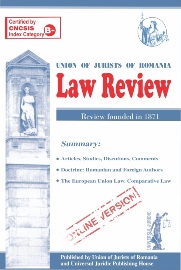ASPECTS OF PERSONAL DATA PROCESSING BY ROMANIAN CIVIL COURTS ACTING IN THEIR JUDICIAL CAPACITY
ASPECTS OF PERSONAL DATA PROCESSING BY ROMANIAN CIVIL COURTS ACTING IN THEIR JUDICIAL CAPACITY
Author(s): Adrian CristoloveanSubject(s): Law, Constitution, Jurisprudence, Civil Law, Human Rights and Humanitarian Law, EU-Legislation
Published by: Universul Juridic
Keywords: Private Law; European Union Law; GDPR; civil courts; court proceedings; court decisions; judicial activities;
Summary/Abstract: Although the data protection supervisory authorities are not competent to supervise processing operations of courts when acting in their judicial capacity, the General Data Protection Regulation also applies to the activities of courts and other judicial authorities which must ensure compliance with the rules of this regulation. Therefore this paper aims to explore the processing performed by civil courts in their judicial capacity, without overlooking the impact of the internet age on the publication of personal data from pending cases and judgments. To this end we’ll analyse the provisions of Regulation (EU) 2016/679 and the national legal framework regarding the processing of data by the courts, without overlooking a recent trend in dealing with processing operations performed by the Court of Justice of the European Union (CJEU). At first glance it seems that our civil courts were left to their own devices as to data protection since the Romanian national supervisory authority is not competent to supervise processing operations of courts acting in their judicial capacity and the Romanian legislator did not entrust this mission to specific bodies within our judicial system. However despite the absence of a right to lodge a complaint with a supervisory authority or to an effective judicial remedy against a supervisory authority, the data subjects – plaintiffs and defendants – may resort to the right to an effective judicial remedy against the controller for the protection of their personal data processed by a civil court. Since the right to the protection of personal data is not an absolute right and it must be considered in relation to its function in society and be balanced against other fundamental rights, in accordance with the principle of proportionality, not always will prevail the rights of the data subject, or, better said, they will not be able to prevail before the balance tilts – sooner or later – in favour of the data subject.
Journal: Law Review
- Issue Year: 2019
- Issue No: Supliment2
- Page Range: 113-122
- Page Count: 10
- Language: English
- Content File-PDF

